1. Let f (x) be continuously differentiable on the interval \[\left(0 ,\infty\right)\] such that f(1)=1 and
\[\lim_{t \rightarrow x}\frac{t^{2}f\left(x\right)-x^{2}f\left(t\right)}{t-x}=1\]
for each x> 0. then
\[\int_{1}^{2}f\left(x\right) dx\] is
a) \[\frac{1}{3}\log 2+\frac{14}{9}\]
b) \[\frac{1}{3}\log 2+\frac{13}{4}\]
c) \[\frac{1}{5}\log 2+\frac{13}{4}\]
d) \[\frac{1}{3}\log 2+\frac{5}{9}\]
Explanation:
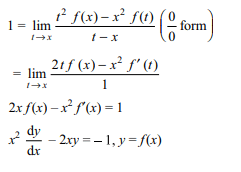
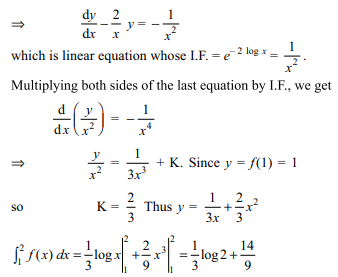
2. If y = f (x) is a solution of \[y^{2}y'\sin x=\cos x\left(\sin x-y^{3}\right),y\left(\frac{\pi}{2}\right)=\sqrt[3]{\frac{7}{4}}\]
then \[\int\left(f\left(x\right)\right)^{3} dx\] is equal to
(upto a constant)
a) \[-\frac{1}{4}\cos x-\frac{1}{4} cosec x \cot x+\log \mid \tan\frac{x}{2}\mid\]
b) \[-\frac{1}{4}\sin x- cosec x \cot x\]
c) \[-\frac{3}{4}\cos x-\frac{1}{2} cosec x \cot x+\frac{1}{2}\log \mid \tan x/2\mid\]
d) \[-\frac{1}{4}\cos x+ cosec x \cot x\]
Explanation: Let y3 = z, the given equation reduces to

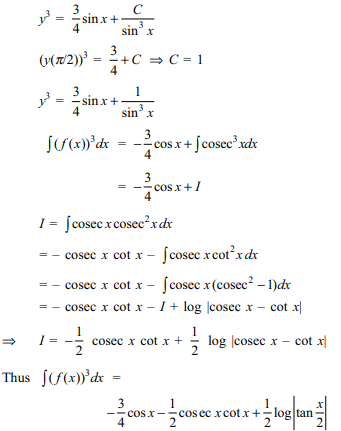
3. Let f be a non - negative function defined on the interval [0,1] . if
\[\int_{0}^{x} \sqrt{1-\left(f'\left(t\right)\right)^{2}}dt=\int_{0}^{x} f\left(t\right)dt, 0\leq x\leq 1\]
and f(0)=0 , then
a) f (1/2) < 1/2 and f (1/3) > 1/3
b) f (1/2) > 1/2 and f (1/3) > 1/3
c) f (4/5) < 4/5 and f (2/3) < 2/3
d) f (4/5) > 4/5 and f (1/3) < 1/3
Explanation: Differentiating w.r.t. x the given equation, we have
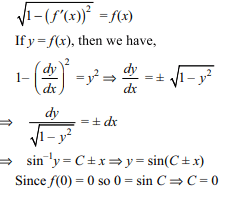

4. Solutions of the differential equation
\[\left(\frac{dy}{dx}\right)^{2}-\frac{dy}{dx}\left(e^{x}+e^{-x}\right)+1=0\]
are given by
a) \[y+e^{-x}=C\]
b) \[y-e^{-x}=C\]
c) \[y-e^{x}=C\]
d) Both a and c
Explanation: The given equation can be written as

5.The solutions of \[y=x\left(\frac{dy}{dx}+\left(\frac{dy}{dx}\right)^{3}\right)\]
are given by
a) The constant function y = 0
b) \[y=p^{-3}e^{\frac{1}{2}p^{2}}\left(p+p^{3}\right)\]
c) \[y=p^{3}e^{-\frac{1}{2}p^{2}}\left(p+p^{3}\right)\]
d) Both a and b
Explanation: Clearly the constant function y = 0 is a solution.
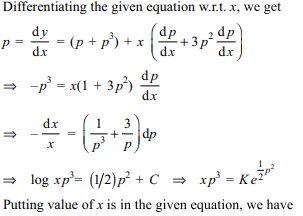

6. The solution of \[y_{1}\left(x^{2}y^{3}+xy\right)=1\]
is
a) \[1/x=2-y^{2}+C e^{-y^{2}/2}\]
b) the solution of an equation which is reducible
to linear equation
c) \[e^{y^{2/2}}\left(\frac{1-2x}{x}+y^{2}\right)=C\]
d) All of the Above
Explanation: Rewriting the given equation, we have
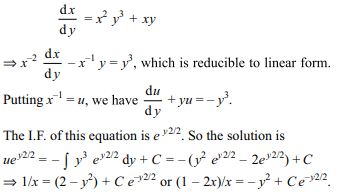
7. The solution of
\[\frac{dy}{dx}=\frac{x^{2}+y^{2}+1}{2xy}\] satisfying y(1) = 1 is given by
a) a system of hyperbola
b) a system of circles
c) \[y^{2}=x \left(1+x\right) -1\]
d) Both a and c
Explanation: Rewriting the given equation, we have

8. The solution of \[\frac{xdx+ydy}{xdy-ydx}=\sqrt{\frac{a^{2}-x^{2}-y^{2}}{x^{2}+y^{2}}}\]
is
a) \[\sqrt{x^{2}+y^{2}}=a\left(\sin \left(\tan^{-1}y/x\right)+C\right)\]
b) \[\sqrt{x^{2}+y^{2}}=a\left(\cos \left(\tan^{-1}y/x\right)+C\right)\]
c) \[y=x \tan \left(const+\sin^{-1}\frac{1}{a}\sqrt{x^{2}+y^{2}}\right)\]
d) Both a and c
Explanation: Taking x = r cos \[\theta\] and y = r sin \[\theta\] so that

9. The solutions of (x + y + 1) d y = dx , y(0)
= 0 are
a) \[x + y + 2 = 2e^{y}\]
b) log (x + y + 2) = C + y
c) \[2\int_{0}^{1} e^{y} dx -\int_{0}^{1} y dx=\frac{3}{2}\]
d) All of the Above
Explanation: Putting x + y + 1 = u, We have du = dx + dy and the given equations reduce to u(du - dx) = dx
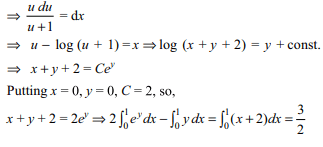
10. If y = f (x) is a solution of \[xy_{1}-y= x\tan \frac{y}{x},y\left(1\right)=\frac{\pi}{2}\]
then
a) \[\sin \frac{y}{x}=\pm x\]
b) \[\int_{0}^{1} ydx=\frac{3}{8}\pi\]
c) \[cosec\frac{y}{x}=\mid x\mid\]
d) Both a and b
Explanation:

